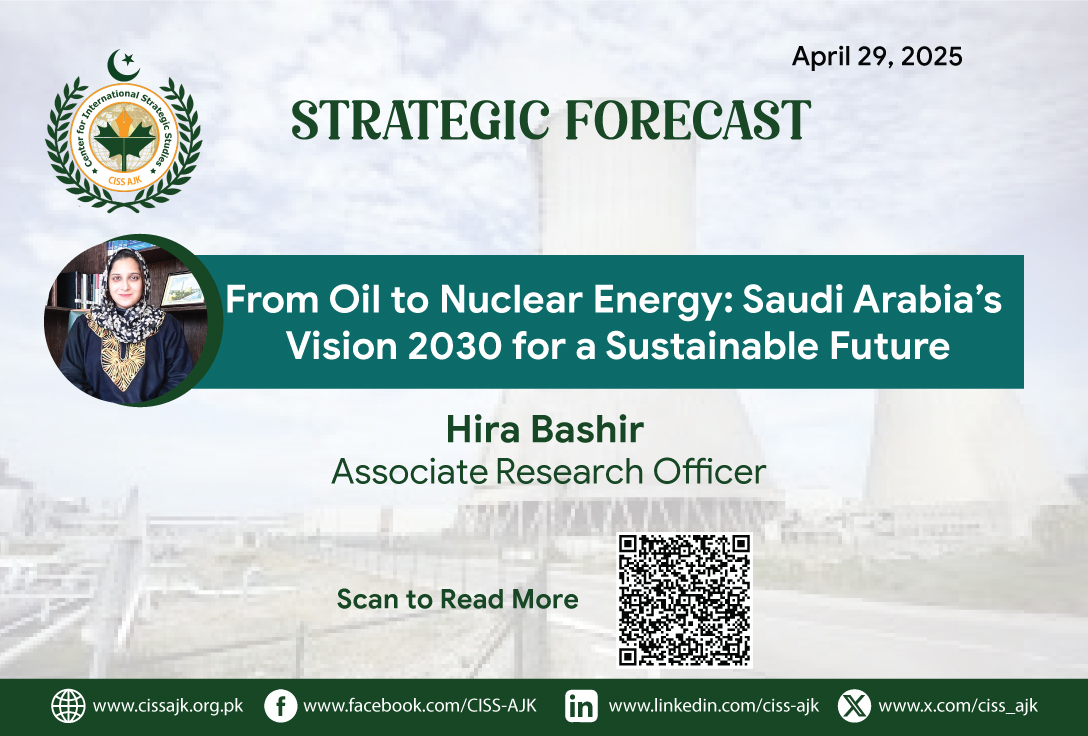In August 2009, Saudi Arabia announced that it would focus on exploring a nuclear power program. This initiative led to the April 2010 royal decree emphasizing atomic energy’s importance in addressing electricity needs, decreasing fossil fuel consumption, and increasing desalination capabilities. King Abdullah City for Atomic and Renewable Energy (KA-CARE) operates from Riyadh to research alternative energy sources while executing nuclear power initiatives and waste management alongside treaty responsibilities.
During the 1970s, Saudi Arabia and other Arab countries had a firm monopoly over oil. The primary source of economy for these countries was oil production but then it was politicalized during the oil embargo. Over time, they realized that sole dependence on oil could not maintain economic stability as oil is a carbon-depleting resource and will not last forever. Also, new technologies are emerging like electric cars would impact the oil demand. In fact according to research, by 2050, electric vehicles (EVs) could make up to 60%–70% of all cars on the road.
Because of these evolving dynamics, Saudi Arabia understood that it needed to diversify its economy. A healthy economy cannot depend on just one resource. They needed to create an energy mix, using different sources of energy like nuclear power, hydroelectric power, and others instead of relying only on oil.
To lead this change, Crown Prince Mohammed bin Salman introduced Vision 2030, a plan to build a strong, diverse economy for the future. Under Vision 2030, Saudi Arabia aims to diversify its economy and reduce its dependence on oil by investing in renewable and nuclear energy. The Kingdom’s nuclear program targets two main goals: meeting domestic energy needs and reducing emissions. Nuclear energy is also seen as a tool to strengthen economic stability and secure the energy sector.
Saudi Arabia is currently working on various nuclear energy projects with international partners. It is working with Russia’s Rosatom to develop nuclear power plants and establish nuclear waste management systems. Simultaneously, Saudi Arabia and China are collaborating to build High-Temperature Gas-Cooled Reactors (HTGRs). The Kingdom is also working with South Korea on the construction of SMART reactors that costs $1 billion, and are carbon zero energy sources. To ensure that all nuclear activities meet international standards, Saudi Arabia signed the Comprehensive Safeguards Agreement with the International Atomic Energy Agency (IAEA) in 2024.
The United States collaborates with Saudi Arabia to establish Saudi Arabia’s civilian nuclear program. The U.S. Energy Secretary Chris Wright declared this prospective deal during his Riyadh visit. The countries continue to establish the framework that will direct their joint work.
Wright highlighted that the agreement needs to comply with the U.S. Atomic Energy Act of 1954 because it mandates the use of “123 agreement” specifications to permit U.S. involvement in nuclear projects abroad. According to U.S. Atomic Energy Act of 1954, the government along with private organizations must fulfill strictly defined non-proliferation requirements before assisting any foreign nuclear development effort.
The implementation of a nuclear agreement between Saudi Arabia and the United States would create substantial financial advantages for both countries. The adoption of clean and stable nuclear energy systems would provide Saudi Arabia with advantages through reduced oil dependence. Such an agreement would increase Saudi oil exports which would produce more revenue and would enable Saudi Arabia to jobs in technology while fostering new construction and energy industries thus supporting the nation’s economic development goals. For the US, this deal can open business opportunities for their companies to sell equipment and services, creating job avenues.
This deal can also encourage other countries in the Middle East Region to shift towards nuclear energy from fossil fuel, which is hazardous for the environment hence contributing to climate change. In this regard, nuclear energy provides a sustainable solution contributing towards net zero carbon emission.
BIO:
Hira Bashir is Associate Research Officer at the Center for International Strategic Studies (CISS) AJK and also Pursuing MS from Muslim Youth University Islamabad. Her area of research is civilian use of nuclear technology.

